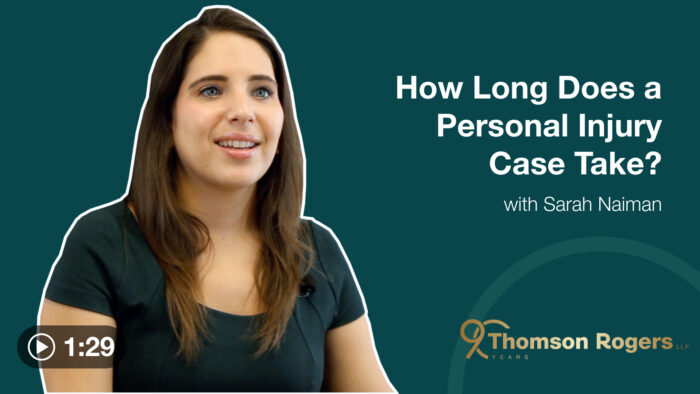Attendant Care Benefits Under Bill 198: Who, What, When, Where and How
Author(s): David F. MacDonald
September 1, 2005
Under Bill 198, family members who provide attendant care to accident victims may have access to two potential sources for payment of their care services. Those sources are the Attendant Care Benefits under the Statutory Accident Benefit Section (S.A.B.S.) and/or a claim against a person at-fault for the accident pursuant to the provisions of the Family Law Act.
The following case scenario raises issues related to S.A.B.S. Attendant Care entitlements:
Mary, mother of Brendan (8) and Annie (6), suffered catastrophic brain injuries in a motor vehicle accident. Now three years after the accident she remains hospitalized. Her needs are met by the hospital and by the family. The ward has sixteen patients. It is staffed by four nurses. Mary receives two hours of rehabilitation during weekdays.
As a result of the virtual loss of their mother the children have suffered various psychological impairments. They require attendant care to supervise them, to assist them with their personal care activities and to assist them in light of their impairments.
Mary’s mother, Sophia has assumed the role of attendant care provider for Mary and the children.
- Who is entitled to attendant care benefits
Pursuant to S.A.B.S. sections 2 (1) and 16 (1), any person who has sustained an impairment as a result of the accident is entitled to attendant care benefits. Both Mary and her children have sustained impairments. All are entitled to attendant care benefits. - Who provides the attendant Care?
The hospital does not provide attendant care and has no obligation to provide attendant care. The Ministry of Health and Long Term Care has stated:“Simply put, attendant care (or personal support services) is not a service provided by a nurse; it is not an insured service [for OHIP to pay] under the Health Insurance Act; it is not an insured hospital service under the [Hospital Insurance] Act; and, lastly, it is not an OHIP insured [hospital] service.”Previously, the Ministry indicated:“Health care services not included in the OHIP assessment [and therefore to be paid by the automobile insurers include] …- attendant care,
- personal support,
- assistance with personal hygiene,
- assistance with activities of daily living.”
- Where can the care be provided – in hospital by family members and/or sitters?
Yes. Attendant care benefits are payable by the insurer if needed in hospital and/or following discharge. Often, family members will provide care when:“the applicant lacks the ability to independently get in and out of a wheelchair or to be self-sufficient in an emergency” or “if the applicant lacks ability to respond to emergency or needs custodial care due to changes in behaviour” [Part 2 of the Form 1]. - What is the trigger for determining and accessing attendant care benefits?
Sections 16 and 39 of the S.A.B.S. detail the process for assessment and obtaining payment. Completion of the Form 1 is the trigger. - What happens when the insurer receives the Form 1?
Under Section 39: An insurer can accept the Form 1 amount or, within fourteen (14) days of receipt, can dispute it by arranging an assessment at an Attendant Care Designated Assessment Centre (DAC).While waiting for the DAC, the insurer has the obligation to pay the attendant care pursuant to Section 39 (6) of the S.A.B.S. - What amount of care should be claimed for Mary?
Mary requires 24-hour-per-day care. As four nurses attend sixteen patients daily, there is one nurse for four patients. In a twenty-four hour period, each nurse would have no more than six hours per day for one-to-one care. As such, Mary receives six hours of nursing assistance, and two hours of rehabilitation each week day. Mary is receiving one-to-one medical or rehabilitation assistance from an OHIP paid health care professional for eight of twenty-four hours each week day.Mary requires attendant care for the remaining sixteen hours each day. Sophia can claim payment for the actual hours she attends to Mary, to a maximum of sixteen hours per day and eighteen hours on weekends. The number of hours is multiplied by the Form 1 rates applicable to each type of care to get a total amount payable per month. When Sophia is absent, a “private sitter” can care for Mary. - What amount of care should be claimed for Brendan and Annie?
Sophia should claim for the actual number of hours spent with Brendan and Annie to a maximum of the number of hours the Form 1 indicates is their need. As such, Sophia cannot claim attendant care benefits during school hours or hours with treatment providers or other outside the home activities which don’t involve Sophia.Importantly, Section 16, does not limit the amount of attendant care to be claimed to that which is directly required due to the impairment caused by the accident.
Section 16 is only a trigger to entitlement. - What care does the Form 1 quantify?
Section 16 (4) indicates that the amount payable under the Form 1 shall be determined using a Form 1.Care that is required “as a result of the accident” – The Form 1 states:
“Use this form to report the future needs for attendant care required by the applicant as a result of an automobile accident.“.Importantly, the Form 1 does not state:
‘attendant care as a direct result of the impairment‘The Form 1 is designed to permit assessment of any and all attendant care needs that exist as a result of the accident.
Brendan and Annie virtually lost their mother and all the care she provided as a result of the accident and each suffered an impairment.The attendant care benefit to which each is entitled will be the total of the care they require:- for their impairment;
- for their routine personal care needs under Part 1 of the Form 1; and
- for their basic supervisory care needs under Part 2 of the Form 1.
- How does an injured person “incur” an “expense” for attendant care provided by family members?
The courts interpreted this phrase in the case Smith v. Wawanesa, where Mr. Justice Campbell concluded that:“For an insured to incur an expense, one need not actually receive the items or services or spend the money or become legally obliged to do so. It is sufficient that the reasonable necessity of the service or item and the amount of the expenditure are determined with certainty…”
The Financial Services Commission has adopted and accepted Justice Campbell’s comments. In the case of McMichael and Belair, a Form 1 had attested to twenty-four hour attendant care need. The Form 1 had quantified the expense of that need. The Arbitrator ordered that the attendant care be paid in accordance with the Form 1, less periods of time that the claimant was in attendance with treatment providers.
In the appeal decision of Stargratt and Zurich, Director’s Delegate Makepeace concluded:
“I agree with the arbitrator that Ms. Stargratt is not precluded from claiming benefits because her family did not expect or demand payment.”
The arbitrator in S. D. and T.T.C. indicated:
“A person who is unable or unwilling to promise payment in exchange for housework because of financial hardship and who did not in fact make any promise, could nevertheless ‘incur’ an implied obligation to pay within the meaning of the schedule.”
In a decision in which the writer was counsel for the applicant, L.F. and State Farm, Mr. F. had not paid his parents and/or his fiancé for their services and did not tell them they would be paid. Mr. F. was awarded attendant care benefits initially and on appeal:
“These procedural rules provide at the disposal of an insured an immediate interim money benefit where a mutual examiner has determined the need for attendant care, so that insureds, while in pain and disability following an accident, do not have to scramble for assistance, relying essentially on the voluntary kindness of family and friends.”
In addition to the S.A.B.S. Attendant Care Benefit, if the injured person has sustained a “permanent, serious impairment of an important physical, mental or psychological function”, family members who provide attendant care have claims for the value of their services from the at-fault parties. Sub-sections 61 (2) (a) and (d) of the Family Law Act provide this right.
Section 61 of the Family Law Act
61 (2) The damages recoverable in a claim under sub-section (1) of section 61 may include:
“(a) actual expenses reasonably incurred for the benefit of the person injured or killed; …
(d) where, as a result of the injury, the claimant provides nursing, housekeeping and/or other services for the person, a reasonable allowance for loss of income or the value of the services”.
Copies of the authorities referred to and a precedent letter for payment of attendant care are available upon request. Contact [email protected] or by telephone at 416-868-3155.
Share this






